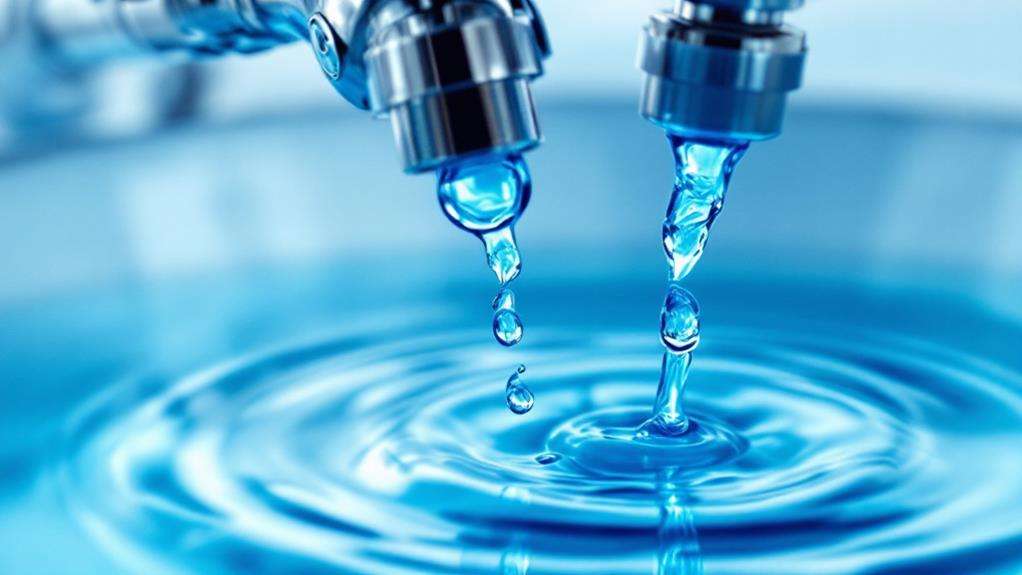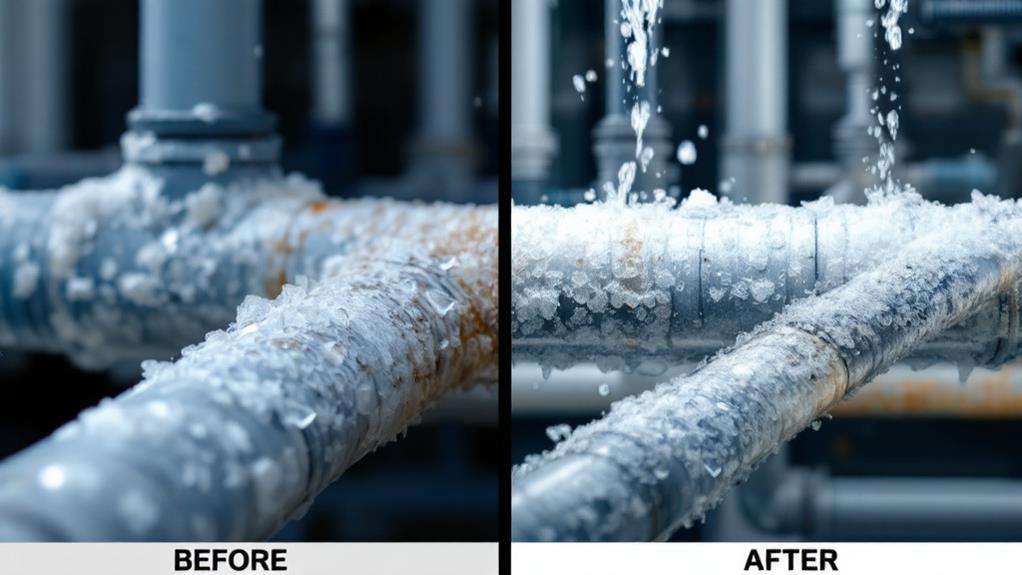How to Prevent Buildup and Scale With Water Treatment Solutions
To prevent scale buildup in your water systems, start by evaluating your water quality through extensive testing. Implement pretreatment strategies like water softeners or reverse osmosis to remove scale-forming minerals. Use chemical treatments such as threshold inhibitors and dispersants to keep minerals suspended. Consider targeted solutions like scale sticks for specific appliances. Optimize your system's design to reduce stagnation and increase flow velocity. Regularly clean and maintain equipment, including heat transfer surfaces. Combine these approaches in a comprehensive treatment plan customized to your specific water conditions. By understanding the intricacies of scale formation, you'll be better equipped to protect your equipment and maintain efficiency.
Understanding Scale Formation
Scale formation is a common challenge in water treatment systems. You'll encounter this issue when water-soluble contaminants like calcium, magnesium, iron, and silica precipitate due to limited solubility. These inorganic materials form a coating on surfaces, leading to various types of scale, including calcium carbonate, calcium phosphate, and magnesium silicate.
Understanding scale formation is pivotal for effective water treatment. The process is influenced by several factors, including temperature, pH, and the concentration of scale-forming materials. As water flows through your system, these contaminants can crystallize directly onto surfaces or accumulate as sludge deposits. This buildup can reduce efficiency and cause damage to your equipment.
To prevent scale formation, you'll need to address the root causes. This involves controlling the concentration of scale-forming minerals, adjusting pH levels, and implementing mechanical changes to reduce the likelihood of scale development. By using high-quality makeup water, maintaining appropriate treatment cycles, and applying chemical treatments, you can effectively manage scale buildup. Remember, proactive water treatment is key to preventing scale formation and ensuring the longevity of your system.
Effects of Scale on Equipment
Now that you're familiar with how scale forms, let's examine its impact on your equipment. Scale deposits can wreak havoc on your water-using appliances, clogging tubing and coating heating and cooling elements. This buildup considerably reduces energy transfer and efficiency, forcing your equipment to work harder and consume more energy to achieve the same results.
In commercial ice makers, scale not only forms from mineral deposits but also from freezing water, compromising the machine's performance. Steamers and boilers are particularly susceptible to scale buildup, requiring frequent deliming – an acid cleaning process – to remove these stubborn deposits. Without proper maintenance, you'll notice a dramatic decrease in your equipment's efficiency and lifespan.
Scale doesn't just affect large appliances; it can also impact your plumbing fixtures, reducing water flow and potentially causing leaks. In cooling towers, mineral deposits hinder heat transfer, leading to decreased cooling capacity. By understanding the effects of scale on your equipment, you can better appreciate the importance of implementing effective water treatment solutions to prevent these issues and maintain ideal performance.
Water Quality Assessment Methods

Evaluating water quality is the indispensable first step in developing an effective treatment plan. To assess your water supply, you'll need to employ various methods that provide accurate data on its composition and characteristics. Start by conducting a comprehensive water analysis, which typically includes testing for pH levels, hardness, dissolved solids, and contaminants.
One of the most common assessment tools is a water quality test kit. These kits often include:
- Test strips for quick pH and hardness measurements
- Colorimetric tests for chlorine and other chemical levels
- Bacterial tests to detect harmful microorganisms
For more precise results, consider sending samples to a certified laboratory. They can provide detailed reports on mineral content, heavy metals, and other potential issues that may affect your water treatment system.
Regular monitoring is essential for maintaining optimal water quality. Install inline sensors in your water filter system to continuously track key parameters. This real-time data allows you to quickly identify and address any changes in your water supply, ensuring your treatment plan remains effective. By implementing these assessment methods, you'll be well-equipped to design and maintain an efficient water treatment solution customized to your specific needs.
Pretreatment Strategies for Scale Prevention
After evaluating your water quality, you'll need to address one of the most common issues in water treatment: scale prevention. Hard water, rich in calcium and magnesium, can lead to scale buildup in your plumbing and appliances. Fortunately, several pretreatment strategies can effectively prevent scale formation.
Water softeners are a popular choice to combat hard water. They use ion exchange to remove calcium and magnesium, preventing scale buildup in your water systems. If you're looking for a more thorough solution, reverse osmosis systems can filter out dissolved minerals, producing purified water and reducing scale likelihood.
To slow down the scaling process, consider installing sediment and carbon filters. These remove particulates and contaminants that act as nucleation sites for scale formation. Another option is to use polyphosphate feeders, which introduce scale inhibitors into your water supply, interfering with mineral crystallization.
For those seeking alternative technologies, water conditioners that use electromagnetic or electronic methods can alter the structure of dissolved minerals, disrupting their ability to form scale on surfaces. By implementing these pretreatment strategies, you'll effectively prevent scale and maintain the efficiency of your water systems.
Chemical Treatments for Scale Control

Chemical treatments for scale control offer a powerful arsenal in the fight against mineral buildup. You'll find various effective options to combat scale formation in your water treatment systems. Threshold inhibitors are your first line of defense, preventing scale crystals from growing and adhering to surfaces. These chemicals work alongside crystal growth modification polymers, which alter the shape and structure of scale crystals, making them less likely to stick to equipment.
Dispersants are another essential tool in your scale-fighting toolkit. They keep scale-forming minerals suspended in the water, preventing them from settling and accumulating on surfaces. When you're dealing with existing scale deposits, acid treatments can be your go-to solution. Hydrochloric or sulfuric acid can dissolve stubborn buildup and keep scale-forming minerals in solution.
To control biological fouling that contributes to scale development, consider using oxidizing agents like chlorine or bromine. These chemicals help:
- Eliminate microorganisms that promote scale formation
- Maintain clean surfaces in your water treatment systems
- Reduce the overall risk of scale buildup
Scale Sticks: A Targeted Solution
Tackling scale buildup in specific equipment calls for a targeted approach, and that's where scale sticks come into play. These specialized tools are designed to combat the formation of scale in water-using appliances, particularly where magnesium and calcium deposits become problematic as temperature increases.
You'll find scale sticks made of durable materials housing food-grade polymer scale inhibitors. When installed directly into your water supply line, they gradually release compounds that interfere with mineral crystallization. This process effectively prevents scale from adhering to surfaces, even in high-temperature environments.
You can use scale sticks in various equipment, including coffee makers, ice machines, dishwashers, combi-ovens, steamers, and reverse osmosis systems. To maximize their effectiveness, install them upstream of critical appliances prone to scale buildup. This guarantees that treated water flows through your equipment, protecting it from mineral deposits.
While scale sticks are a powerful tool in your arsenal against hard water issues, remember that they're most effective as part of a thorough water treatment strategy. Tailor your approach to your business's specific needs to optimize equipment performance and longevity.
Mechanical Approaches to Reduce Scaling

While chemical treatments like scale sticks are effective, you can also employ mechanical approaches to combat scale buildup. By increasing water flow velocity, you'll minimize the time minerals have to crystallize on system surfaces, preventing scale buildup. This strategy is particularly useful in:
- Coffee makers with narrow channels
- Ice machines with intricate water pathways
- Industrial heat exchangers with complex piping
You can optimize your piping system's design to reduce areas prone to stagnation, where scale often forms. Installing heat exchangers with larger surface areas helps disperse scale-forming minerals, reducing their concentration and likelihood of deposition.
Don't overlook the power of regular maintenance. Incorporate on-line cleaning systems, such as sponge ball recirculators, to physically dislodge and remove scale deposits. These systems can be especially effective in commercial and industrial settings.
For smaller appliances, make it a habit to inspect and clean heat transfer surfaces regularly. This practice maintains efficient heat exchange and prevents scale from gaining a foothold. By combining these mechanical approaches with chemical treatments, you'll create an extensive strategy to keep your water systems running smoothly and scale-free.
Implementing a Comprehensive Treatment Plan
Success in combating scale buildup hinges on a thorough treatment plan. To efficiently prevent scale formation, you'll need to implement a multi-faceted approach that addresses your specific water quality challenges. Start by considering pre-treatment methods like water softeners, which replace calcium and magnesium ions with sodium ions, reducing the hardness of your drinking water. Filtration systems can also help remove high concentrations of minerals before they have a chance to form scale deposits.
Next, incorporate chemical treatments into your plan. Scale inhibitors and dispersants can keep scale-forming minerals suspended in the water, preventing them from adhering to surfaces. These chemicals are particularly effective when used in conjunction with pre-treatment methods.
Don't forget the importance of regular monitoring and maintenance. Inspect and clean your equipment routinely to guarantee ongoing effectiveness in preventing scale buildup. This includes checking filters, adjusting chemical dosages, and cleaning surfaces as needed.
For the best results, consult with water treatment experts who can help you tailor a comprehensive plan to your facility's specific needs. They'll consider factors like water quality, equipment requirements, and operational goals to design an ideal solution for preventing scale formation.
